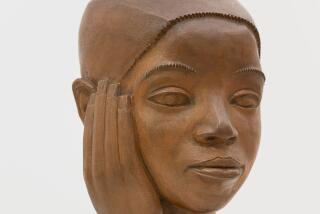Poet Linton Kwesi Johnson Finds the Right Words Again
- Share via
There’s a simple reason why Linton Kwesi Johnson’s show tonight at the Music Machine will be his first Los Angeles performance in five years.
Johnson, the British “dub poetry” pioneer whose politically charged poems set to fluid reggae arrangements were among reggae’s most dynamic recordings between 1978 and 1984, was afraid he had run out of words.
“I actually had put music aside for about four years,” said Johnson during a phone interview from Vancouver. “I hadn’t been writing--I stopped because I thought basically I had dried up.”
But the lack of fresh material after his last studio album, 1984’s “Making History,” hadn’t lessened European appetites for Johnson’s live performances. The demand was so great that the poet joined forces with his regular collaborator, bassist/producer Dennis Bovell, for a 1988 tour celebrating Johnson’s 10-year career. Bovell and the Dub Band are also backing Johnson on the current tour.
Johnson wasn’t inactive during his dry spell, serving as arts editor for the now-defunct Race Today magazine and doing journalistic work for British television and BBC radio. But that return to concert activity had an unexpected benefit: It got Johnson back in the writing groove, and now he plans to record a new album this summer.
“When I mentioned to a fellow poet from the Caribbean that I had started writing again, he said, ‘Nonsense, you must have been writing in your head,’ ” Johnson recalled.
“Which basically was true--I had been thinking about ideas for poems, putting things down on paper, but never really completed anything and . . . well, the muse has come back to me, let’s put it that way.
“I think I just had too many distractions because poetry needs time for meditations. I was running here and there, traveling around doing reports on television. There was absolutely no time to sit down and apply my thoughts and ideas.”
Johnson, 37, was reared in rural Jamaica and migrated to London in 1962 to join his mother. He earned a degree in sociology and began writing poetry after forming a writers’ workshop during his involvement with the Youth League of the British Black Panther Party in the early ‘70s.
He first experimented with blending his words with music with the Rasta Love percussion group in 1972. While working for Virgin Records later in the decade, Johnson suggested the label finance a demo recording of his work. That led to the “Dread Beat An’ Blood” album released under the name Poet & the Roots in 1978. Four more albums for Island followed, and a live double album was released in America in 1986 by Shanachie.
Johnson’s work influenced a number of later poets, including the late Michael Smith and Mutabaruka, and his charged analyses of social conditions in England opened a window on life in black Britain.
In many respects, his albums were analogous to Gil Scott-Heron’s politicized, poetic commentaries on the American scene during the ‘70s, and can be seen as a British reggae bridge to the black consciousness being forcefully expressed by rap artists today.
“I can’t say I’m a big fan of any of these rapping artists, but I can identify with some of the sentiments that they’re expressing,” said Johnson.
“I think none of them have come near to Grandmaster Flash’s ‘The Message.’ I’m encouraged by the fact that, even in some of the dance hall things in Jamaican reggae, there’s this movement back to social consciousness and social issues.”
More to Read
The biggest entertainment stories
Get our big stories about Hollywood, film, television, music, arts, culture and more right in your inbox as soon as they publish.
You may occasionally receive promotional content from the Los Angeles Times.










